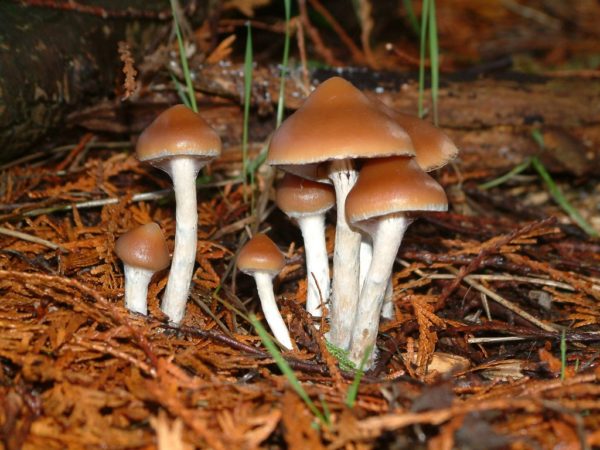

The measure, which was behind in early returns on election night but edged closer with each new batch of ballots counted, ended up pulling ahead with a 51 percent to 49 percent margin in the final unofficial results posted on Wednesday afternoon.
Its provisions prohibit the city government from using any resources to impose criminal penalties against adults over 21 years of age for personal use and possession of psilocybin, the active ingredient in so-called “magic mushrooms.”
Initiative 301 also specifies that going after people for the mushrooms is the city’s “lowest law enforcement priority” and establishes a review panel to assess and report on the effects of the change by early 2021.
The eventual victory came after several local news organizations projected the measure’s failure.
The new ordinance—written by an advocacy group called Decriminalize Denver—is just one example of how drug policy reform activists are increasingly setting their sights beyond marijuana, which has been legalized in a growing number of states despite its ongoing federal prohibition.
In Oakland, California, for example, advocates said last month that they’ve secured a City Council sponsor for a measure to decriminalize not only magic mushrooms but also plant-based psychedelics such as mescaline cacti, ayahuasca and ibogaine. The resolution could be voted on as soon as this month.
Also in California, activists took an initial step last week toward drafting a ballot measure to decriminalize psilocybin statewide. Once their language is finalized, they will need to collect signatures from more than 600,000 voters in order to qualify it for the 2020 ballot.
In Oregon, advocates are collecting signatures in support of a proposed ballot initiative to legalize the medical use of psilocybin and otherwise lower penalties for using, growing or delivering it.
Researchers are increasingly studying whether psilocybin can help people suffering from conditions like anxiety, obsessive-compulsive disorder, major depressive disorder and alcohol dependence, among others, with some positive results to date.
Talk of psychedelics and broader drug reform is starting to make its way into the 2020 presidential race, in which nearly every Democratic candidate—with a notable exception in former Vice President Joe Biden—supports legalizing marijuana.
Washington State Gov. Jay Inslee (D), for example, said in an interview last month that he is open to decriminalizing psilocybin. He opposed marijuana legalization prior to the voters of his state enacting it via a 2012 ballot measure.
And Former Colorado Gov. John Hickenlooper (D), who was also against his own state’s legal cannabis measure that passed the same year, said in March that “criminalizing drug use has not worked” and that the federal government should not block states from ending the prohibition on additional drugs.
While Denver Mayor Michael Hancock and District Attorney Beth McCann said they did not support the new psilocybin initiative, there was no organized opposition to the campaign—nor was there a “cons” section arguing against the measure in the city’s official voter guide.
It was unclear leading up to Election Day whether voters would embrace the issue. Polling ahead of the vote was limited, with just one known survey from last year showing 45 percent of Denver voters in favor of psilocybin decriminalization and 35 percent against.
The measure’s passage is likely to put potential drug policy reforms beyond marijuana legalization on the radar of more policymakers and politicians, similar to how the approval of cannabis-related ballot initiatives by voters spurred lawmakers who had long shied away from the issue to feel more emboldened to embrace it.
It remains to be seen whether the Trump administration will weigh in on the new Denver mushroom policy or the psychedelics measures that are being proposed elsewhere, and what the members of Congress who represent those areas will do to defend them from potential federal interference.
Tom Angell publishes Marijuana Moment. Follow him on Twitter for breaking news, subscribe to his daily newsletter and support cannabis journalism on Patreon.
more recommended stories
 Fentanyl Seizures at Border Continue to Spike, Making San Diego a National Epicenter for Fentanyl Trafficking
Fentanyl Seizures at Border Continue to Spike, Making San Diego a National Epicenter for Fentanyl TraffickingFentanyl Seizures at Border Continue to.
 Utah Man Sentenced for Hate Crime Attack of Three Men
Utah Man Sentenced for Hate Crime Attack of Three MenTuesday, August 8, 2023 A.
 Green Energy Company Biden Hosted At White House Files For Bankruptcy
Green Energy Company Biden Hosted At White House Files For BankruptcyAug 7 (Reuters) – Electric-vehicle parts.
 Former ABC News Reporter Who “Debunked” Pizzagate Pleads Guilty of Possessing Child pδrn
Former ABC News Reporter Who “Debunked” Pizzagate Pleads Guilty of Possessing Child pδrnFriday, July 21, 2023 A former.
 Six Harvard Medical School and an Arkansas mortuary Charged With Trafficking In Stolen Human Remains
Six Harvard Medical School and an Arkansas mortuary Charged With Trafficking In Stolen Human RemainsSCRANTON – The United States.
 Over 300 People Facing Federal Charges For Crimes Committed During Nationwide Demonstrations
Over 300 People Facing Federal Charges For Crimes Committed During Nationwide DemonstrationsThe Department of Justice announced that.
